|
|

Vol. 3 No. 44. Delhi, Thursday, July 5, 1945. Reg. No. L5015
Roundup Staff Article Where once the United States was taking only one prisoner to every 99 counted Jap dead, on Okinawa the percentage increased to 11 percent and on Luzon to 14 percent, Under-Secretary of War Robert P. Patterson said this week in commenting on psychological warfare. Patterson declared that the increasing number of Japs who are surrendering "marks progress in wisdom among the general run of Jap soldiers." Many Japs who have surrendered have come through the U.S. lines waving red, white, and blue "surrender passes" dropped by U.S. planes, Patterson said. He declared that the Jap government was very sensitive about this type of warfare, "but there is little they can do about it." He said the U.S. psychological warfare campaign is based on two solid foundations: (1) truth, and (2) the hard advance of American forces. As America's heavy punches were beginning to tell on the former "fight-to-the-death" attitude of the Japs, it was disclosed this week by Rear Adm. Forrest Sherman that the Jap Navy had very little left with which to punch back. Sherman declared that the Imperial Fleet merely poses a mopping-up problem to the powerful U.S. Navy. He declared that the Jap fleet consists only of these remaining units: Two partly converted battleships; a half-battleship-half-carrier; the Nagato nearly equal to the U.S. battleship West Virginoia now inactive; and two other old battleships now unfit for service. According to Sherman, the Japs have a small number of carriers, including two or three fairly large ones not ready for service, a few cruisers, and about 30 destroyers. Sherman said the Navy would be glad to see the remaining Jap fleet come out and do battle. "Whenever they expose themselves, they can be destroyed," he said. Senate Confirms Hill Promotion The India-Burma Theater's shiniest new brigadier general, Francis Hill, 35, of Brockton, Mass., arrived in the Far East
When Hill, then a major, arrived in Burma, a quick readjustment of his assignment was necessary. Selected as one of a group of six American officers to instruct the Chinese in artillery, he was dropped right into the middle of a war. The Japs had taken Rangoon and the Chinese were moving southward to help the British hold the temporary Prome-Toungoon line. Hill's duties were numerous and subject to change without warning during that hectic period, it finally evolved upon him to fill the role of the U.S. mission's assistant Signal Officer, killed in an airplane crash. The new general, a 1933 West Point graduate, remained in China only long enough to brush his teeth. Flown to Delhi, he was soon assigned to Ramgarh Training Center as an artillery instructor for the Chinese who managed to escape from Burma and recruits flown across The Hump. For seven months, he helped forge the force that was to wrest back North Burma from the Japs, then returned to Delhi, now a lieutenant colonel. 14TH AIR FORCE NABS LONE ENEMY RAIDER HQ. 14TH AIR FORCE, CHINA - For the first time in 33 days, the 14th Air Force destroyed an enemy aircraft in the air - a lone Jap Tojo caught by P-51's over Peiping Airdrome. Maj. Gen. C. L. Chennault's pilots concentrated chiefly on ground targets, taking a terrific toll on Nip locomotives in North China, bridges north and south of the Yellow River and river shipping in the Liuchow-Pinglo area. |
Roundup Staff Article
As Tokyo radio predicted an imminent large-scale American landing in China, it was announced from Chungking this week that a 365-mile stretch of the coast line had been cleared of Japanese forces, within the last five weeks.
The Chinese reportedly drove 16 miles up the coast towards Shanghai, 165 miles away. Other Chinese forces in the meantime invaded Indo-China northeast of Caobang, but withdrew after enemy counterattacks.
Liuchow, former 14th Air Force base, fell before the Chinese, who were advancing on Kweilin, 90 miles to the northeast and on Tanchuk, 100 miles to the southeast. Both of these towns were also former USAAF bases for Maj. Gen. C. L. Chennault's flyers.
It was also announced that the island of Weichow, in the Gulf of Tonkin, between Indo-China and Puichow Peninsula, had been reoccupied by the Chinese who wiped out the Nip garrison there. Weichow was described by Army News Service as lying in "American-patrolled waters."
Meanwhile Gen. Joseph W. Stilwell arrived on Okinawa to take command of the 10th Army. U.S. forces were still engaged in mopping-up work on the island. It was stated that casualties to date for Okinawa, including Naval losses, had risen to 46,319. American forces moved in and seized the small island of Kume to the west of Okinawa. There was no opposition.
In the Philippines, Gen. Douglas MacArthur announced that Luzon Island had been secured. The remnants of the Jap forces had been driven into the mountains with the juncture of the 37th Infantry and 11th Airborne Divisions in the Cagayan Valley.
The strongest resistance in the Philippines was on the island of Mindanao. But operations there were described as being in the mopping-up stages, with Americans near the bend of the Davao River. MacArthur said Jap casualties in the Philippines had risen to 419,035, including 9,774 POW's.
The Australian Seventh Division landed at Balik Papan under the personal command of MacArthur, following intensive bombardment by the Seventh U.S. Fleet and battering from the air by the Fifth and 13th Air Forces, and the RAAF. The Aussies had established a beachhead near the great oil center. And in western Borneo other Aussie forces had had taken the Miri oil center and were pressing forward against stern resistance.
Nine more Japanese cities were hit by the incendiary carrying B-29's. They were Bobeoka, Okayama, Nobeoka, Moji, Utsube, Kure, Shimonoseki, Kunamoto and Ube. Nip oil centers were also heavily bombed during the week.
Army Thunderbolts and Navy patrol planes attacked shipping off the Kyushu coast and strafed airfields there.
After Deluges
By SGT. JOHN McDOWELL
Roundup Staff Writer
LEDO, ASSAM - The Stilwell Highway was deluged with record rainfall last week, but despite the unprecedented fury of the monsoon, supplies are still moving along the arterial lifeline to China
There was a temporary stoppage due to the literal flood from the heavens. But the magnificent U.S. Engineers, working day and night, again have the Road performing its customary traffic function.
A terrific storm that lasted six days covered large areas of the Mogaung and Hukawng Valleys in North Burma. Two bridges were washed out and portions of the Road were drowned under as much as four feet of water for a short time.
Engineer veterans shook their heads at the intensity of downpour then set to work to repair the ravages of nature. The hairy ears drained off the covering waters from the highway bed. When the flooding rivers and streams had receded, they erected temporary spans.
This was the heaviest storm the Engineers have had to battle since they started work on the Road almost three years past. Just to give you an idea, Shingbwiyang absorbed 23 inches of rain from the six-day period ending on June 25. On just one day at this spot almost seven inches of water was reported.
At Tingkawk Sakan almost 21 inches of rain fell and Warazup, scene of some of the bloodiest fighting of the North Burma campaign, experienced more than 11 inches.
As one seasoned Engineer wearily sighed, "What they need up here is sailors, not Engineers. But then we built the Road and we'll keep it open. If it can stand a storm like this, it can stand just about anything."
CHIANG CRITICIZES INSUFFICIENT U.S. AID
CHUNGKING - (ANS) - Generalissimo Chiang Kai-shek, in his first press conference since 1941, this week said the United States was not giving China enough economic aid.
He also said that a Chinese soldier, given training and equipment, can fight as well as any three soldiers from abroad and that if it took foreign soldiers two years to defeat Japan, the Chinese soldiers could do it in one year.
Chiang complained that the U.S. had not paid enough attention to China's economic difficulties. He said he enjoyed the military and economic co-operation of Lt. Gen. A. C. Wedemeyer, American commander in China, but he urged that more American economic experts be sent to China.
Chiang urged the Allies to make greater use of Chinese forces, pointing out that it is more economical to train and equip Chinese troops to fight the Japanese on the Chinese mainland than to send troops from abroad.
Meanwhile, Collier's magazine in the U.S. this week carried a story by Wedemeyer, in which he said that China's war effort, target of recent criticism abroad, could be "counted on for valuable contributions to the common effort" against Japan.
Wedemeyer wrote that he had come to regard Chiang Kai-shek as "a great leader and an inspiring, unifying force."
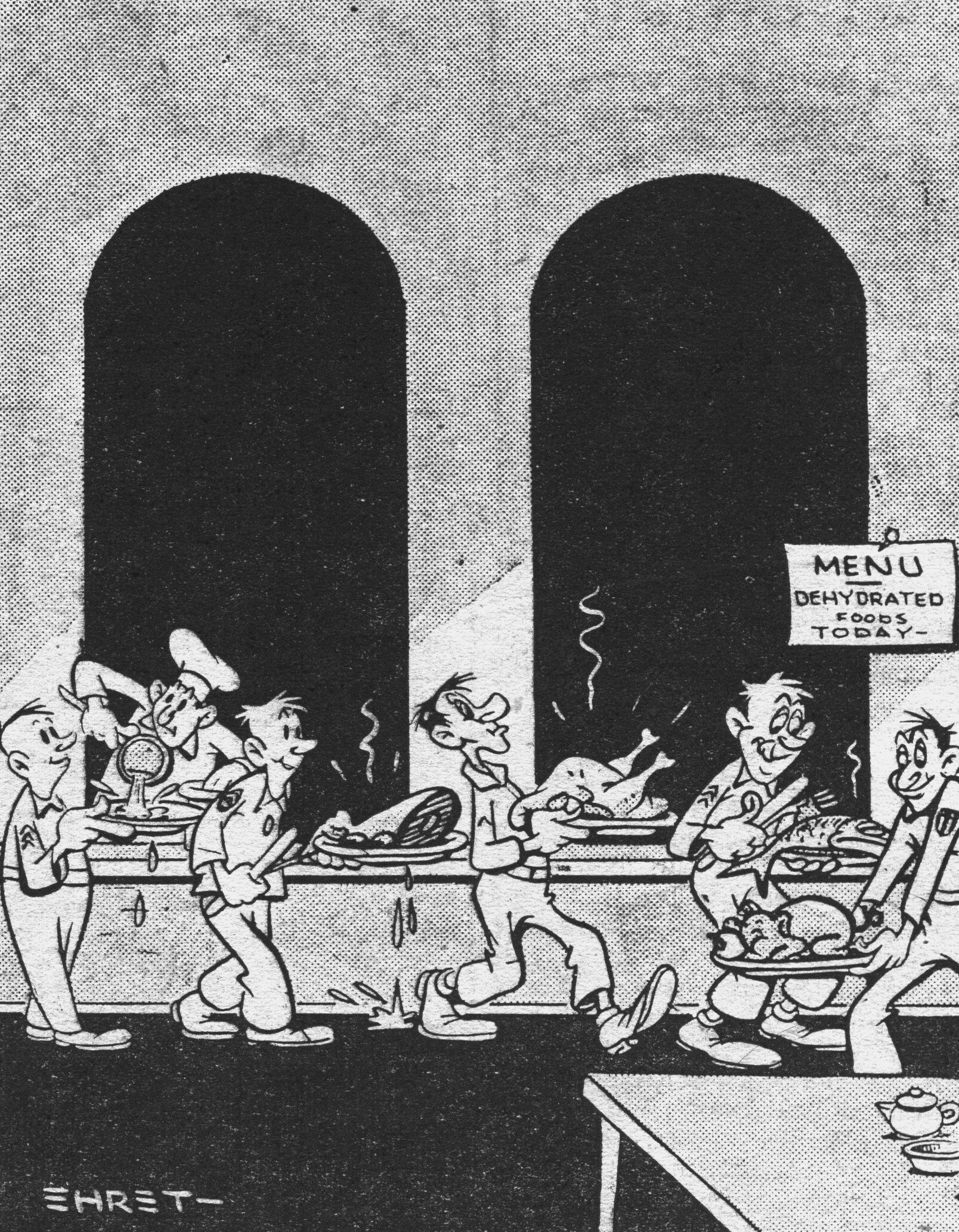
|
Former CBI Flier Guilty
Of Accepting Bribes
Roundup Staff Article
Maj. Walter V. Radovich, former Cochran Commando pilot of the old CBI Theater, this week was sentenced to three years' imprisonment at hard labor and ordered dismissed from the Army by a general court martial at Mitchell Field, N.Y., after being found guilty of charges of having accepted a $7,000 bribe to help two soldiers avoid overseas service.
The defense immediately said they would appeal the case. The papers of the trial are now enroute to a reviewing board in Washington.
One defense witness, unidentified in either United Press or Army News Service copy, stated that Radovich had turned the $7,000 over to the Army, and it had been contributed to "some fund."
WINED, DINED
The testimony by the prosecution showed that Radovich had been wined, dined and taken to prize fights by Samuel and Elias Bayer of New York, who are now awaiting civilian trial. The Bayers were attempting to bribe Radovich into keeping Pvt. Martin Bayer, son of Samuel, in the States. Samuel Usdan, of New York, also awaiting trial, sought sanctuary in the States for his brother, Pvt. Samuel Usdan.
After Radovich had accepted $7,000 to keep the two privates at their Mitchell Field base, where he was then stationed, he himself received orders assigning him to overseas duty. He came to India with the Commando group headed by Col. Phil Cochran, who flew the Wingate Raiders into the heart of Burma.
While over here Radovich was credited with knocking down four Japanese planes. He earned the DFC and a British decoration for bravery in action over Burma. Later, because he said his conscience was hurting him, he confessed his bribe culpability to Cochran and was sent home.
APPEAL BASIS
An indication of the grounds on which Radovich might base his appeal was seen in a story in the New York Daily Mirror, which carried an interview with former Judge Advocate General Samuel T. Ansell. The former JAG stated that Mitchell Field brass hats had confined Radovich for 10 months before bringing him to trial, including seven weeks in the "nut ward." Ansell stated that under Article of War 70 a person is not normally confined more than eight days.
Ansell said the official who investigated the Radovich case recommended that the pilot not be tried for the reason that he was not the only officer involved. The Radovich trial climaxed a series of recent personnel scandals involving Mitchell Field, including reports that around 30 officers and men had formed a clique there.
|
By MR. KARL PETERSON Ex-Roundup Writer
ST. LOUIS - Less than two hours ago I got it; that "little white paper" which Servicemen the world over joke about and look forward to.
It is short and simple: "This is to certify that ... is hereby honorably discharged from the military service of the United States of America. This certificate is awarded as a testimonial of honest and faithful service to this country."
Here at the Separation Center at Jefferson Barracks, between 100 and 150 men a day are getting that little paper, climax of a smooth, 48-hour processing under the hands of skilled personnel of the Seventh Service Command.
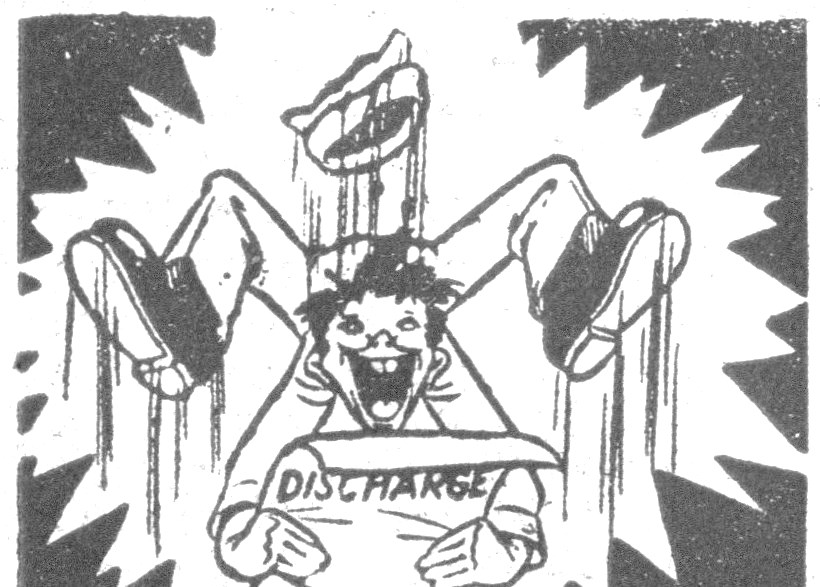
|
For an India-Burma soldier returning home for discharge, the first and hardest step is the Replacement Depot where he clears the Theater in a collection of empty stone barracks scattered over the barren, dust-blown flats of New Malir, outside Karachi, he must sweat it out for three or four days while his records are checked, then spend another three days awaiting air travel. These figures may vary as the flow of homeward bound men increases or falls off.
SNOWED UNDER
Clerks at the "Repple Depot," snowed under with work, patiently check to see that each man has his service record, clothing forms, "shot" record, health certificate, and similar data with him on departure. A minimum of baggage is taken along; the prospective civilian carries two khaki and one woolen uniform, turning in his field equipment, making it easier to make the 65-pound air travel weight limit.
At Karachi one sees pencil pushers from Calcutta, rugged engineers from Ledo, and weary ex-Mars Task Force fighters from Burma. There are air crewmen, ASC mechanics, and QM truck drivers. Some, like S/Sgt. "Dutch" Termini, Marsman from New York City, are "old soldiers." Dutch is an old Panama hand, with well over 100 points. He's going home, but will take a rotation furlough and reassignment instead of a discharge; point winners are permitted to do this.
S/Sgt. Russell Richey, from a photo recon group, has only 14 months overseas, but has three children back in Colorado Springs. T/4 Johnny Ramsden, Pasadena, Calif., was in the National Guard back in 1940 before coming out to New Delhi. Both are on their way out.
STIR HAPPY
These "Circular 40 and 41" men, traveling on No. 2 air priority, are passing up the last of the rotation men, on No. 1's, some of whom have been sweating it out in Karachi for more than a month. They say they're "stir happy," and ask a passing sweeper if he's got a shipping alert list with him, just to prove it. But there are nightly movies, the Red Cross club and a swimming pool to pass away the time. And the well-stocked bar at the Depot day room does a capacity business.
But once you're on your way, there's no stopping short of the States. From Karachi our group caught the C-54 "Skyrocket," a plushy, civilian-style airliner with reclining seats finished in O.D. cloth and orange-brown leather, individual seat lights, a galley aboard, and insulated cabin. We were in Casablanca 24 hours later, having stopped only for gas and meals. Less lucky travelers get backlogged briefly at Cairo.
At Casablanca the once-notorious backlog has been broken by ATC, which recently announced that a C-54 was at that time leaving for the States every 15 minutes, carrying 48 Servicemen home. Some are flown into Miami, some to New York. We are off for New York within eight hours, just enough time to catch up on a little sleep at Camp Duchesne, Casablanca's tent city for transients.
NEW ORDER
New York, with boatloads of ETO veterans pulling into the harbor, and planeloads of North Africa PGC, and CBI boys landing at LaGuardia field, is the country's biggest debarkation point. Here debarkees go at once to either Camp Kilmer, Camp Shanks, or Fort Totten, where clerks (mostly WACs) check the orders which were issued at the Replacement Depot. Within 24 hours they have received new orders to report to that one of the 16 nationwide separation centers which is nearest their homes, and are sent on their way with a railroad ticket and meal money.
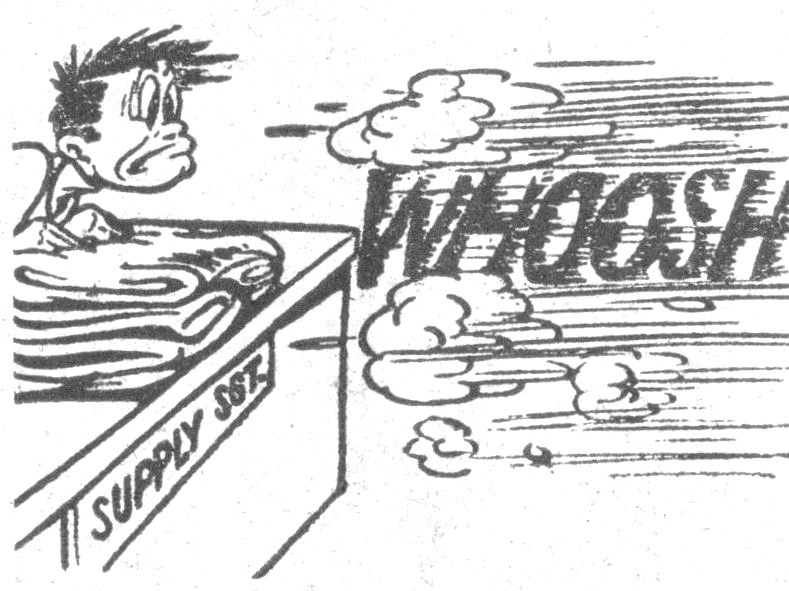
|
Missouri and Iowa men go to Jefferson Barracks, once a big scale boot training center for the Air Corps. Hopeful dischargees report first to the Reception Center, No. 9, where "screening," the crucial stage in the entire discharge process, takes place. Interviewers go over the man's points, checking the service record with him, determining combat and parenthood credit, to confirm the total score. Then comes the question of essentiality - if the individual carries one of the "spec" numbers which has been declared essential by the Army, he must await reassignment to a new unit before leaving for his furlough and a continued military career.
The essential list was recently enlarged to include some types of clerks, to obtain processing personnel for these very discharge centers, and cooks, but the list changes frequently. If the hopeful soldier makes it past this hurdle, he is good as out, and after filling out an interview card with personal data, he moves over to the separation center itself for final processing.
GOOD AS OUT
The hard-working boys here do a great job of rushing through the impatient veterans who become increasingly nervous in the service in their last hours of military life. Dog tags are checked first of all, as the Army doesn't want to discharge the wrong man by mistake, then home addresses are obtained for making out of mustering out payments.
Then for the last time you tangle with a supply sergeant, get two shirts, two pair of trousers (generally one wool and one khaki uniform), a blouse, a pair of shoes, an overcoat if it's winter, a barracks bag and all your socks, underwear, towels, handkerchiefs and toilet kit. All else is turned in. This deal took less than two minutes per man, and not one man in our group was challenged for the shortage of any items charged to him on his Form 32.
PHYSICAL EXAM
Going out, as in, the soldier gets a really comprehensive physical, practically identical to the induction process: eye, ear, nose and throat, heart, blood, urinalysis, psychiatry, etc., plus repeated questions about wounds or injuries suffered in service. At this time the men are invited to submit any claims on the Army for treatment or compensation for such service-incurred disability. The dentist at the center provides final dental service to anyone wishing to hold up a day or two to take advantage of the free Army treatment.
Barracks are comfortable and mess hall chow excellent at a separation center, the Army tries to leave a pleasant last impression. Our group (dischargees are processed by "rosters" of about 35 men at a time) did nothing to spoil the mess hall's carefully-watched food wastage record, the "garbage check," tearing heartily into Sunday chicken and ice cream. The reception center mess hall had also been a good one, and filled with a strange collection; battle-weary veterans of such outfits as the 1st Armored and 34th Infantry divisions sat next to beardless 18-year-old draftees, less than 24 hours from their Missouri farm homes, still in civvies, being inducted and shipped out for training, mostly to Texas and the Infantry.
INDUCTEES AWED
These "Johns," some of them startlingly young, are awed at the arrays of "fruit salad" sported by the overseas men, the combat infantry badges, bright division patches, Purple Hearts with clusters and Silver Stars on the chests of ETO returnees. Recruits can be seen pausing from their tasks of mopping barracks or polishing latrine fixtures to eavesdrop on some loud account of what "the Jerries threw at us at Saarbrucken" or "that little blonde at Karlsruhe." The dischargees, in their own way, are surprised at the novelty of anyone just going into the Army at this time.
Following the medical exam in the separation process comes counseling, with trained interviewers furnishing information and literature about conversion of G.I. insurance, job prospects, and anything else the soldier wants to know about. These men also fill out the dischargees Army qualification record, his "G.I. history" which shows his service and type of work performed, a valuable record for an ex-soldier searching for a job.
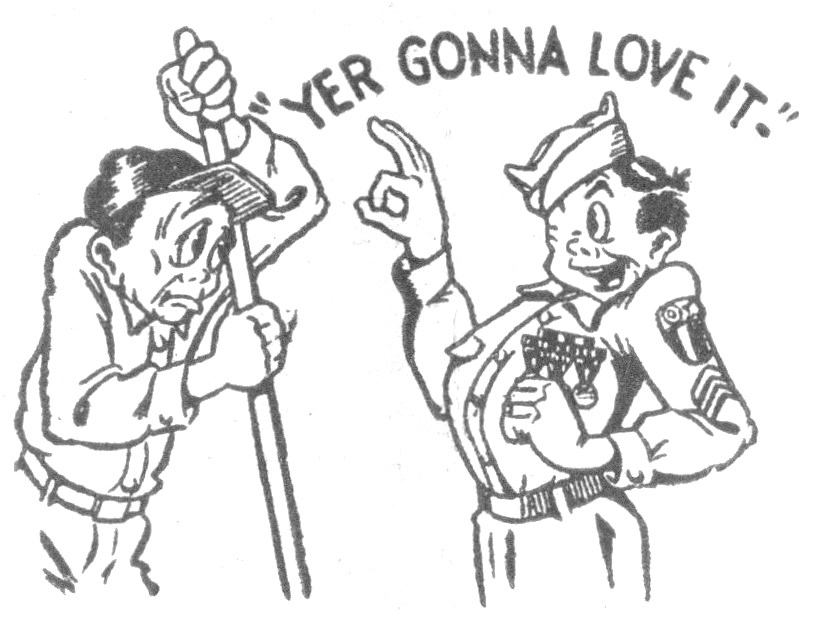
|
After the "exductee" has had an embroidered discharge emblem sewn on the right breast of his uniform he signs his final papers, with three signatures, and a couple of thumb prints, and also puts the John Henry on his last payroll. Almost immediately he collects on that payroll, getting the first of three $100 mustering out pay checks (for overseas men with over 90 days service) along with his pay.
Then comes the big moment - that final G.I. line to be sweated out. Our group, mostly battle worn foot soldiers from Europe, had chafed visibly at the inevitable minutes of waiting around between steps in the processing, using an ETO catchline, "Let's get these men in out of the hot sun," or passing away the time with arguments over how fast a reconnaissance column could move along a German autobahn. The infantrymen jibingly called the Artillerymen "noncombatants." There was an endless crap game which started out rough with folding money, ended two days later with the losers playing for pennies. Conversation was sprinkled with French and German words: "Shot the 16 bucks," cried one G.I. enjoying a hot streak, "I got beaucoup money to get off you so-and-so's."
Now, as we stashed away the crisp government-issue payroll money for the last time, a young Captain faced us. He made a short speech: "The Army wishes to thank you men for the honorable service you have rendered." The boisterous veterans were quiet now; one by one, as their names were called, they stepped up, shook hands with the Captain, and received their little white paper. We looked at the words "awarded as a testimonial of honest and faithful service to this country," and thought back through the preceding three or four years - the places visited and people met, being in training and going under fire for the first time, all the buddies we had known, including those who weren't coming back, wild furloughs and latrine details, good times and bad.
Memories brought sentiment, and suddenly the Army was like an old Alma Mater. A great experience lay behind us, one to recall for the rest of our lives. Quietly the new civilians gathered up their baggage, shook hands in farewell with one another, and took off for their homes, the nearest bar, or both. We were out.
Pinch Hitting for Sgt. Charles Clark Eyes bugged open at The Hangar, ARC club at Agra, when, with a show of nonchalance, Sgt. Sid Radner slipped out of a pair of double-locked handcuffs. But the piece de resistance was yet to come. He laced on a straight-jacket, then in full view of the audience tore it to shreds. "It's quite simple," drawled the sergeant, "All you have to do is dislocate your shoulder blades." Name any good alternative, sarge, and we'll take it.
|
PX EXPLAINS CARD RESTRICTION
AS GOAL FOR RATION INCREASE
Lately Theater personnel have been cursing out the Post Exchange because the sacred privilege of using their buddy's ration card has been revoked.
Like many things in the Army which seem at first sight to be just more Army red tape, the recent PX insistence that you must restrict yourself to your own ration makes sense and in the long run will rebound to your own good.
The situation at present is this: When an officer or enlisted man presents his ration card he must show some identification if asked. If not, the PX can refuse to serve him. Just to clarify a G.I. rumor the checking of identification applies to officers as well as enlisted men.
Here is the reason for the PX's "cracking down." Our authority for the following statements springs from Theater PX Officer, Maj. K. L. Kepley, and executive PX officer, Capt. C. C. Grasey.
Post Exchange draws one ration per man per month. It goes on the supposition that there will be a surplus at the end of the month since some men do not normally use all their ration. For example, there are men who do not smoke and some who, horrors, turn up their noses at beer. It has been the hope of the PX here that they could use this monthly surplus to expand the individual ration.
But instead of a monthly surplus the PX found it was facing a deficit. This was due to two reasons (1) men leaving the Theater turning over their cards to friends, (2) men who did not normally smoke or drink allowing their ration to be used by others.
As Keplet explained, this situation killed any hope of expanding the individual ration. In order to build up a surplus, with the eventual hope of expanding the ration, and possibly in some remote future eliminating rationing altogether, it was decided to restrict every man to his own ration.
Another complaint has come from transients. Men from the weeds have been knocking at the Roundup door complaining that although their ration cards are supposed to be good anywhere in the Theater, they are actually good only at their home station. Under the new ration card system, which went into effect Theater-wide on June 25, the policy on transients is this:
They are allowed to draw eight cans of beer and a carton of cigarettes for each 10 day period, that is between the 25th of one month and the fifth of the following month; the fifth and the 15th and the 15th to the 25th when they are at a station other than their own.
But their total for the month cannot add up to more than their basic ration. So if they have already drawn part of their monthly ration at their home station they can only draw what they would normally receive at their home station.
So actually the ration card is not good 100% Theater-wide in the sense that a transient cannot draw all of his monthly ration at one time as he can at his home station. This is due to the fact that APO allotments are based on strength reports.
But if every man will use only his own ration the following will result: (1) eventual enlargement of the individual ration; (2) transients will be able to draw their full ration wherever they go from the accumulated stockpile.
"And for the benefit of newcomers to the Theater," said the PX chief, "will you put in a request that they do not give away their cigarettes or beer as baksheesh. In doing so, they are just robbing other American soldiers of their supply."
Finds Mother, Sister
After Four-Year Try
BENGAL AIR DEPOT - A four-year search through three European countries has finally rewarded Pvt. Chris T. Collier of a QM outfit here with the reassuring news that his mother and sister are alive and well.
The story comes right out of the pages of an E. Phillips Oppenheim thriller.
Chris, his brother and sister were born in Ohio, but when the depression hit the U.S. in 1930, everyone in the family save his father returned to the land of his parents' birth, Corfu, the playland of Greece.
Easing conditions permitted Chris' return to the U.S. in 1935, that of his brother a year later.
"Transportation difficulties delayed Mom's return, and when the war broke out in 1939 we ran into a lot of red tape because she wasn't a citizen," Collier recalls. "Sister stayed with her. Then Mom decided to visit her folks in Tirania, Albania, and she was there when Mussolini took over.
"From then on, there was a complete blackout of news."
A few days after Pearl Harbor, Collier's older brother enlisted in the Navy. Chris followed into the Army in October, 1942. They secured the aid of the Red Cross to search for their mother and sister, and Corfu, Greece, Albania and Italy were combed - but to no avail.
Finally, in June, 1944, a short message was relayed through ARC channels: "We are well. Do not worry."
Only that and nothing more. No source. No explanation.
There followed another news blackout until the other day. Then a dirty, crinkled, undated envelope arrived - apparently smuggled out of Albania and long on its way. Mother and sister, they wrote, were well and cheerful and looked forward to seeing Chris and the family.
|
YOU WANT CHEESECAKE 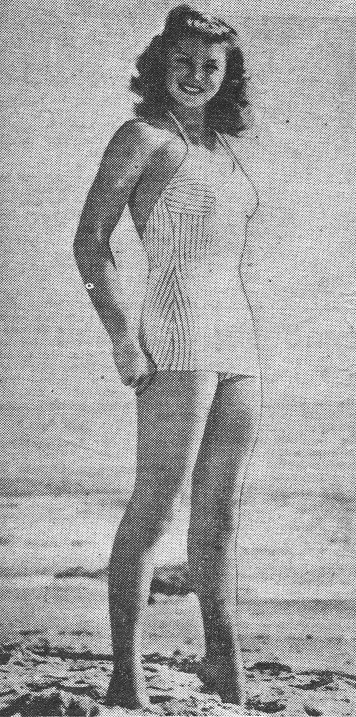
Here It Is. |
‘Hangover Square’ In Demand
1304th AAF BU - When enlisted men of this base were given permission to build their own recreation club, contributions exceeding Rs. 7,000 flowed in and this week "Hangover Square" was almost complete and only half of the building fund had been spent.
Salvage material furnished most of the equipment for the club, which the EM claim will be the Theater's "finest enlisted men's club" when it's finished.
Even in its unfinished state, it's reported that the base C.O. has offered to swap the Officer's Club for "Hangover Square." No dice.
SEAC WAC's Go Home Under Point System
HQ., SEAC, Kandy, Ceylon - 1st/Sgt. Antoinette Mihalovich and M/Sgt. Grace Brock are on their way to the U.S., first WAC's in SEAC to be released under the War Department demobilization point system.
Sgt. Mihalovich, Wheeling, W. Va., has been first sergeant of the WAC Detachment since its formation in New Delhi, India, late in 1943.
Sgt. Brock, Cleveland, Tenn., has been in charge of WAC's, WREN's and WAAF's in the communications office of SEAC Headquarters. She was in a group of seven girls who, in August, 1942, were first to be sworn in as WAC's in Tennessee. Sgt. Brock has 51 points and Sgt. Mihalovich 49. Forty-four is the minimum required for discharge.
SHANGRI-LA?
CHUNGKING - (ANS) - Back from Tibet, where they found natives who had never heard of Europe or knew that China had been at war eight years, two Americans this week, led by a Chinese Government pack train, arrived safely at Kunming after a 21 week trek.
The Americans were Lt. Robert R. Forsyth of Northville, S.D., and Sgt. James Taylor of Kimball, Neb., and Army veterinarian.
The two were flown to Tibet to bring out horses and mules. They were on loan to the Chinese Government horse purchasing bureau. Returning overland they crossed the flood-swollen Yangtze, at one point taking the animals with them in successive trips in a single boat.
NELSON LAUDS ATC RESULTS IN FAR EAST
Roundup Staff Article
Leonard Lyons, New York Post columnist now touring Europe, turned over his column for one day to Donald M. Nelson, who wrote a story generously larded with praise for the men of ATC in the India-Burma and China Theaters.
Wrote Nelson:
"When our American boys get back from abroad, they are going to bring with them many
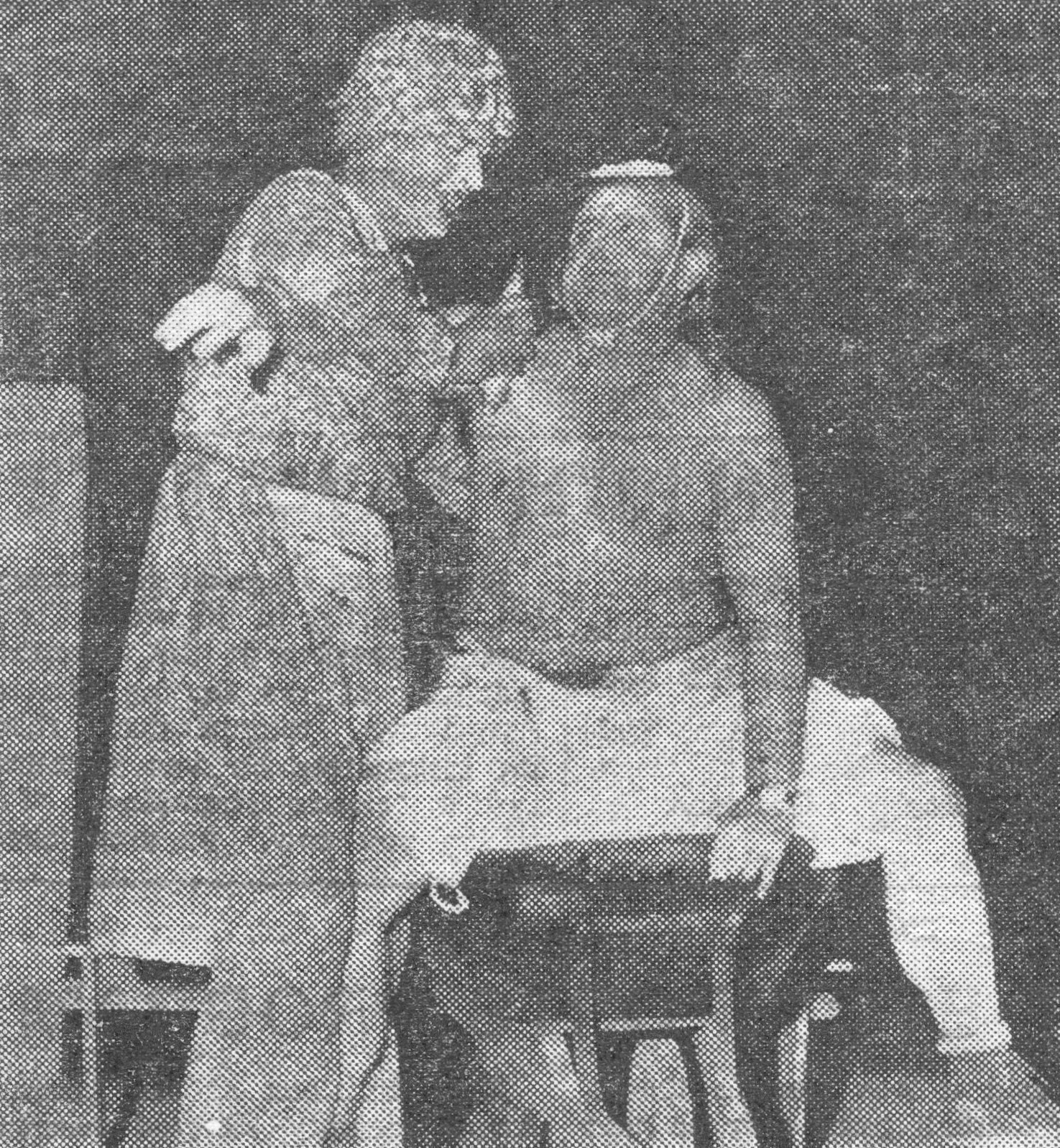 G.I.'s often have more fun than anybody, as evidenced in this skit on a Truth or Consequences show staged at 1347th BU, India.
T/Sgt. Joe Haney, left, and Cpl. Charles Bush muffed on the capitals of the 48 States and lookit the consequences, willya?
G.I.'s often have more fun than anybody, as evidenced in this skit on a Truth or Consequences show staged at 1347th BU, India.
T/Sgt. Joe Haney, left, and Cpl. Charles Bush muffed on the capitals of the 48 States and lookit the consequences, willya?
|
GOOD WILL MAN
"The American soldier, as I have seen him at work and play, has been one of our best emissaries of goodwill, whether in Russia, China, Samoa, the Pacific isles, England or Africa.
"One cannot talk of traveling around the world without speaking with the greatest admiration and respect for the American Air Transport Command. ATC represents at its best American genius for doing hard, difficult almost impossible jobs. It gives anyone a great thrill to see these American boys at work servicing a plane as soon as it lands, whether in Marakech, Morocco; Kano, Algeria; Assam, India; Karachi, Calcutta or Abadan, Teheran.
"I think the job ATC has done in getting most-needed goods into China is one of the great feats in this war and one of the great accomplishments of America and American virility.
ORGANIZATIONAL FEATS
"One can hardly imagine the organizational feat necessary to enable American boys to carry 30, 40, 50,000 tons - not pounds - but tons - of badly needed freight over The Hump, the most difficult mountain range in the world.
"The last time I was at Chabua in Assam, in far-way India, there was an American planned by American boys carrying a planeload of precious cargo over The Hump every seven minutes a day and night in all kinds of weather. And, believe me, the Hump weather is probably as severe as any in the world. American boys are doing this job as nonchalantly as they would fly from New York to Washington."
10th Goes Into Action In East Burma Fight
Roundup Staff Article
The fighters and bombers of Maj. Gen. Howard C. Davidson's 10th USAAF swung into action again this week to strike at the Japanese remnants which are trying to escape into Indo-China from Eastern Burma.
P-38's and B-25's of the North Burma Task Force attacked the Inle Lake area, one of the main Nip escape routes. P-38's of the Flying Crow Squadron went after an enemy bivouac at Tungleong, north of the lake, and covered the target with land mines. Konlon was also hit by the P-38's.
The Heke camp site was bombed by B-25's which also damaged several river craft. The enemy airstrip at Lampang was the objective of another attack by P-38's which went 500 miles from their base for the strike. Namsan and Loilem were also targets.
As RAF Liberators bombed store areas north of Boyagyi and Mosquitos hit the enemy-held villages of Kyaikkatha and Thaton, Allied patrols reported that two villages 26 miles northeast of Pegu have been cleared.
A dispatch from ALFSEA stated that Mawchi will probably be the site of the biggest battle of the Eastern Burma campaign. The Nips are withdrawing towards Mawchi and other units retreating from Kalaw are expected to join them there for a stand.
|
MP STORM TROOPERS
SEEK ‘PEEPING TOMS’
Roundup Staff Article
Those wretched, unprincipled devils, the peeping toms, are on the loose in New Delhi, with the flower of American womanhood sent over here by the Red Cross and various Army agencies the objectives of their wolf-like glances.
The American girls are quartered at the Taj Hotel, which by an odd coincidence also happens to be an officers' billet. Reports have been made that the privacy of their boudoirs has been invaded by the glances of lecherous rogues disguised as Americans.
As Army indignation swelled this week, the Military Police, those fine protectors of American womanhood, joined the Roundup, also an outstanding protector of American womanhood as evidenced by our cheesecake files, in a hunt for the dastards.
The Roundup has made no progress and the MP's are engrossed in mysterious silence. Their first action was to stop all G.I.'s from going inside the hotel gate. Formerly G.I.'s were going inside the grounds to pick up girls on movie dates, etc., and escort them back to their porches afterwards.
However, a disturbing report came in which threatened to upset MP strategy. A G.I. who swears he has been using a strong telescope to keep up on his astronomy, reports that a few nights back he saw a suspect lurking inside the Taj grounds. He described the suspect as a cadaverous ancient-looking individual, with long fangs and wearing the insignia of a colonel.
The Gestapo, after due consideration, has dismissed this report as G.I. propaganda. They are still concentrating on the G.I.'s.
Our undercover man, T/7 Osmosis Fink, reports that if the G.I.'s are banned from the grounds and the reports continue, there can be only one face-saving solution. Some G.I.'s must be disguising themselves in officers' uniforms.

CROSSED LINES However, a very questionable statement is made to the effect that the completed job is "unparalleled in communications history in peace or war." It occurs to me that your reporter must indeed have a tremendous background of communications knowledge in order to arrive at this conclusion. Did the writer consider the superb facilities of the Bell System? Does he know that the Bell company set up an around-the-world circuit some 15 years ago? Does he know that there are telegraph cables under the Atlantic Ocean? If your writer still believes his statement is true, I would like to point out that there is a 2,200-mile line from Edmonton, Canada to Fairbanks, Alaska. No, I can't believe the claim was well considered. If it was meant literally, I can only suggest that your boy be more careful about walking out in the sunlight without his hat. - Pfc. N. J. Fritz, APO 629. There were 100 men in on his malaria experiment, and when it was over, we were the worst bunch of wrecks you'll ever see. More than 80 percent were in the hospital, and a large percent will have recurrent malaria. All we got out of it was the malaria, and brother, if you think that having malaria 10, 12, 16, 18 times is a picnic, ask the men who's had it. Col. Rice deserves credit, sure; but, hell, his guinea-pigs should get a little too, don't you think? You printed his merits. How about ours. On the experiment were 100 mean each from two organizations - and 60,000,000 damned mosquitoes - Cpl. Don Johnson, T/5 Angelo Di Cicco, T/5 Ralph Falzarano, T/5 William H. Stipp. Later on that night one of our men was told by ATC men stationed in Delhi that the hotel, the only place we could find where there was any dancing, was out of bounds only to U.S. enlisted men. May I ask why British enlisted men are allowed to go there are we are not? Who is responsible for the order which seems to discriminate against Americans? - NAME WITHHELD If discrimination exists it is by the American Army against the American Army. A Subject Letter distributed March 1, 1944, signed by the Theater Commander, ruled the Imperial Hotel out of bounds to enlisted men. BORS are not excluded from the hotel because of a recent directive from the War Ministry that no public place in bounds for officers may be placed out of bounds for enlisted men. |
Pictures Of War Bring Up Rear - Six Exchanges For 10 Circuits
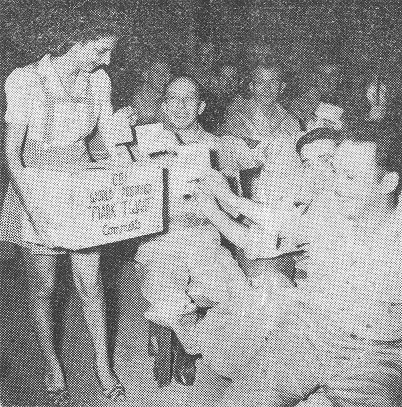 Civilian stenographer Joyce Radley, who was stationed with the U.S. Army at Ramgarh Training Center, acts as hostess at the premiere of the picture
Mark Twain, and collects comment from G.I. fans.
Civilian stenographer Joyce Radley, who was stationed with the U.S. Army at Ramgarh Training Center, acts as hostess at the premiere of the picture
Mark Twain, and collects comment from G.I. fans.
|
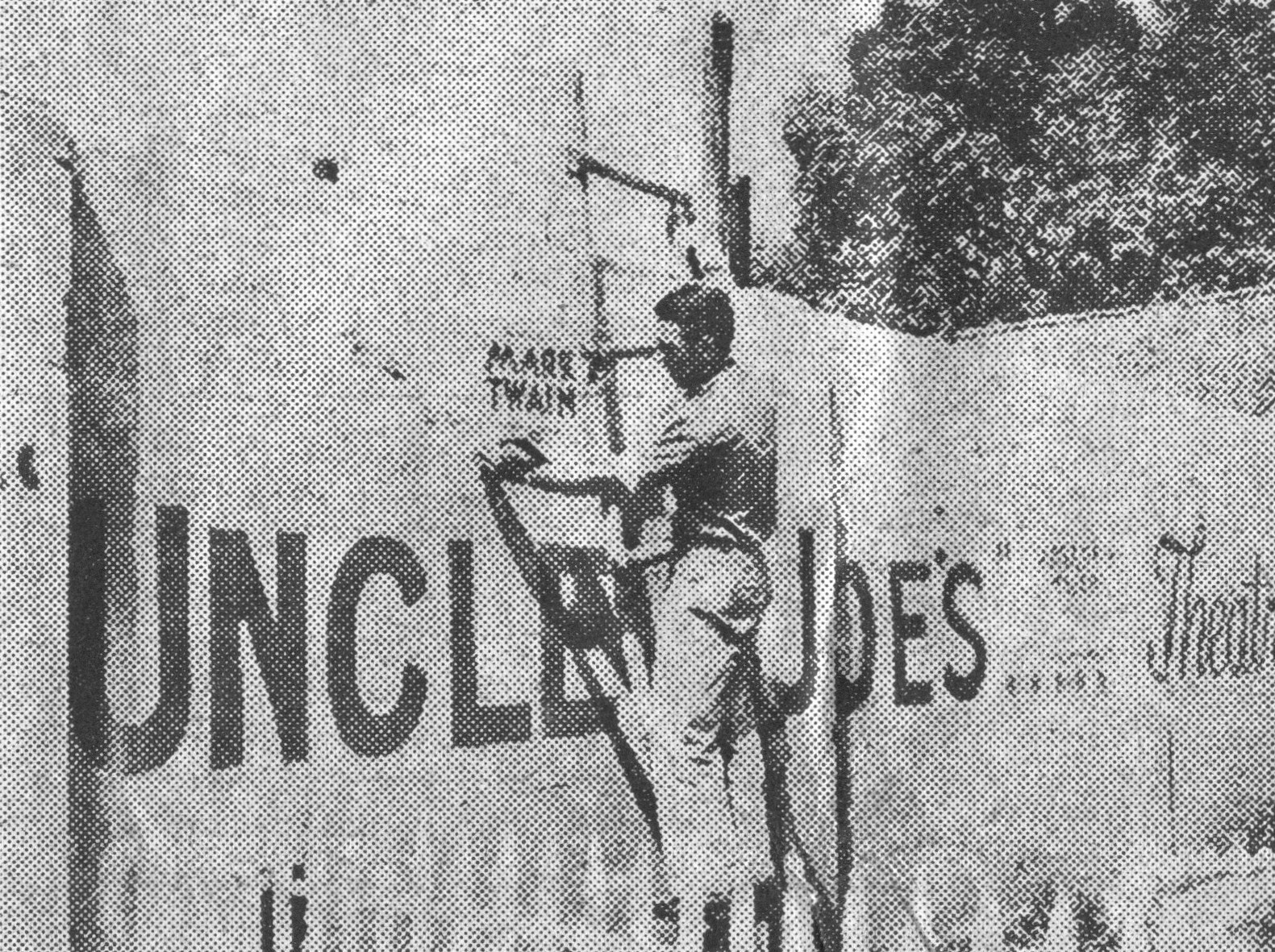 Here Sgt. Bill Voris of Special Service tacks up a promotion poster for the Mark Twain movie.
Here Sgt. Bill Voris of Special Service tacks up a promotion poster for the Mark Twain movie.
|
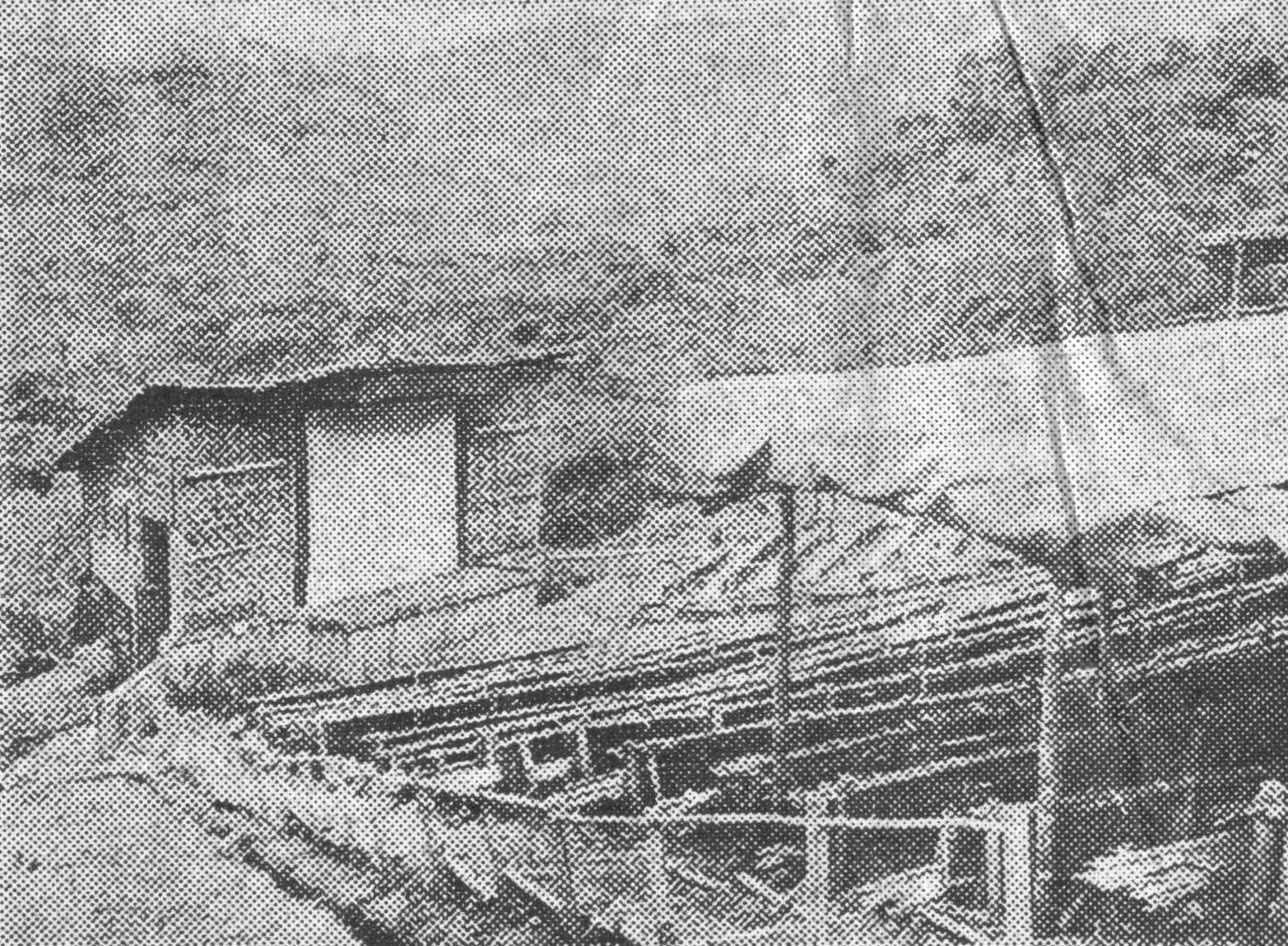 A general view of the seating arrangement and stage of the Theater at Tagap on the Stilwell Road.
A general view of the seating arrangement and stage of the Theater at Tagap on the Stilwell Road.
|
Roundup Staff Writer
If we are to credit reports received by the Army Film Exchange from "gam" conscious Special Service wallahs in the field, the G.I.'s of the India-Burma Theater prefer musical movies, with plenty of scantily-clad gals running around to distract them from Harry James corning up Schuman.
We queried the Research Section if I. and E. to find if they had taken any poll of G.I. movie preferences. It seems they haven't, and since the Special Service reports are not based on a representative cross-section, Research seems to suspect that what has been construed as the opinion of the G.I. is oftimes the personal belief of the Special Services officer on the spot.
But on the basis of the only reports available, musicals, with girls predominating, lead the field, with war pictures a bad last.
All these films, both good and bad, are distributed by the Film and Equipment Exchange Section of Headquarters, Blank Signal Service Company. From Headquarters six exchanges operate in Delhi, Karachi, Calcutta, Chabua, Ledo and Myitkyina. These six exchanges in turn service 10 film circuits which range through-out India and Burma.
TEN CIRCUITS
The 10 film circuits send weekly supplies of film to around 400 motion pictures installations in the Theater. The troops supposedly received a thrice-weekly change in program in each of the show places. We say supposedly because this is the Army, and there is bound to be at least one snafu somewhere. If we were able to say every installation changed its program thrice weekly we would undoubtedly be flooded by letters from G.I.'s protesting they had only last week been compelled to gaze at the porcine profile of Oliver Hardy for seven days running.
It is estimated that five months are required before a picture completes its circulation among the troops working on the three changes pf program weekly. Transportation is one of the big problems, with trucks, tractors, L-5's, cargo planes, jeep railroads, trainmobiles, and foot couriers being utilized.
These 16-mm films which entertain the troops are gifts from the American Motion Picture Industry and are provided free of charge to the Army. Hollywood submits a list of available films, to a selection board of six Service personnel and two civilians.
G.I. REACTION
This board checks the lists and picks out the pictures for overseas screening. The reactions of the troops overseas act as the basis for selection. War pictures are at the bottom of the list among overseas troops and that is why you have been seeing so few of them lately.
It used to be that every hero was either a wounded Guadalcanal Marine who had received a medical discharge or a defense worker whose presence was vitally important to turning out Flying Forts. Possibly after receiving news of overseas opinion, Hollywood is now using a little common sense and comes up with an occasional 4-F, or a guy with dependents. In fact, Hollywood recognizes more cases of dependency than the draft boards.
This Theater, as well as other overseas centers, has been given world premiere showings of many new films. In some cases, they have been released between six and eight months before being premiered back in the States.
The most recent example in this Theater was the picture Rhapsody In Blue, received here on Nov. 11, 1944 and not released back home until June 26, 1945.
Each weekly program also contains a G.I. movie and a combat bulletin. These films have been consistently popular with G.I.'s. They like the variety of news, the short subjects, and the informational films. The community sings also give the uninhibited soul who doesn't dare sound off in the shower a chance to air his Fighter Brand baritone.
The Film Exchange also supplies the troops with War Department instructional films and film strips. There are 1,600 different 16mm subjects available to troops in this Theater. And in the showing of all these films the G.I. operator is a major factor. One G.I. operator said the dream of himself and his compatriots was someday to see an Army sex film in which the guy went out with a gal who was pure.
In fact, this particular G.I. had a very patriotic idea. He thought all the gals with social diseases in Army sex films should be identified as being of German nationality. Thus, he explained, the stigma would be taken off American womanhood and the non-fraternization program would get a boost.
The Exchange system has grown from a staff of one officer and three enlisted men to five officers and 38 men. Whereas, the old staff only distributed one print per picture, at present seven prints per picture circulate Theater-wide.
Since establishment of the first exchange, more than three years ago, there have been 610 different films received in the I-B Theater. Maj. Benjamin Berg is CO of the Blank Signal Service Company, while Capt. Donald Howe has recently replaced Capt. Thomas Bostic in charge of film distribution.
Some members of the original staff are still passing out pictures. S/Sgt. J. B. Hankins, who has sweated out 33 months over here, specializes in instructional films and strips, while W/O C. R. Davidson, Sgt. Randall Giesey and T/4 Richard A. Green and T/5 Mario Festa say they have never missed a weekly shipment of entertainment film to the field during their two years of service in India-Burma. They are especially looking forward to what the India movie wallahs describe as a smashing finale, entitled Three Down and None To Go.
 American soldiers and Marines wrested Okinawa from the Japanese so Superfortresses could increase their bomb loads by one and one-half tons.
Left: a 155-mm howitzer shells Jap positions in southern Okinawa.
Center: a Marine charges through Jap machine-gun fire in quick courageous action.
Right: Infantrymen of the U.S. 10th Army, now led by Gen. Joseph Stilwell, use a spliced ladder to bridge a gulch to get at the Sons of Heaven.
American soldiers and Marines wrested Okinawa from the Japanese so Superfortresses could increase their bomb loads by one and one-half tons.
Left: a 155-mm howitzer shells Jap positions in southern Okinawa.
Center: a Marine charges through Jap machine-gun fire in quick courageous action.
Right: Infantrymen of the U.S. 10th Army, now led by Gen. Joseph Stilwell, use a spliced ladder to bridge a gulch to get at the Sons of Heaven.
|
PRESENT AWARDS TO U.S. PERSONNEL
One Soldier's Medal and four Bronze Stars were recently presented to U.S. personnel in I-B and SEAC commands.
The I-B recipients were Cpl. Edward L. Conley and Sgt. Lester C. Shuholm. Conley received the Soldier's Medal for heroism in extinguishing a raging fire in a gasoline tanker. Shuholm won the Bronze Star for meritorious service in constructing cold storage facilities for food preservation.
The SEAC recipients, who had their medals pinned on by I-B Theater Commander, Lt. Gen. R. A. Wheeler, were T/4 William G. Lentz, Bernard A. Aumuller, and Richard Leacock. The awards were made for combat photography while serving with the British Army in Burma.
DEDICATE CHAPEL AT MYITKYINA
MYITKYINA - The new chapel at Myitkyina, scene of some of the bloodiest fighting of the Burma campaign, was recently dedicated.
Work on the chapel site was started three months ago by Engineers. The site chosen was near a former ammunition dump used by the Japanese in defense of the town.
Many organizations and individuals gave freely of their time to build the chapel. Pvt. William Weiss, an interior decorator in civilian life, did most of the work in the sanctuary, with Cpl. Henry Nagle, chaplain's helper rendering great assistance. Catholic, Jewish, and Protestant services are held in the chapel.
MONSOON SQUARE GARDEN OPENS:
FIRST BOXING SHOW
ARMSTRONG USO TROUPE PRESENT
CALCUTTA - Base Section's new hangar arena, Monsoon Square Garden, debuted this week with its first nocturnal boxing card of the

|
Ernie Copeland, of Calcutta, chalked up his 23rd victory in 24 overseas bouts by taking a hairline five-round decision over Ledo's
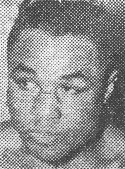
|
The scrap was strictly a tossup and some of the fans let the judges know they didn't agree one bit with their decision.
Copeland scored more points on number of blows, but Campinha had a long edge on pure viciousness of sock.
In the feature five-rounder, I-B Heavyweight Champ Morris Strafford, of Ledo, decisioned Lester Carter, of Camp Howrah, Calcutta. Both ringmen practically needed adrenalin and dextrose to finish the last two rounds, with Strafford able to swing a few more punches than his opponent.
The touring Negro USO troupe, headed by Hammerin' Hank Armstrong, was introduced from the ring.
Other results -
Chester Martin, of Assam, scored a second round TKO over William Reid, of Ledo. Jim Claitor, of Camp Kanchrapara, scored a second round TKO over Joe Hawkins, of Assam. George Sheppard, of Ledo, decisioned Rubin Young, of Burma. Earl Lawrence, of Bengal Air Depot, decisioned Joe Dias, of Ledo. Willie Brown, of Camp Howrah, decisioned George Holten, of Assam. Benny Flake, of Ledo, scored a second round TKO over Ellis Jackson, of Camp Kanchrapara.

1328th AAF BASE UNIT - A strong, well-balanced Negro team representing Squadron D scored in nine of 10 events for a total of 51 points to carry off the track and field championship at this ATC base in Assam.
The new titleholders took four first places, four seconds and four thirds along their route to the title.
Individual honors were won by versatile Pfc. Joe Rushin of Squadron B, who captured 14 points by finishing second in the shot put, discus and 220-yard dash and sharing a tie for second in the 440.
At meet's conclusion, Lt. Col. Claron U. Pratt, Commanding Officer, presented the winning team with a beautiful trophy.
Individual winners -
880 - Pfc. Jasper Cobb, Squadron D, 2:54; 100 - Cpl. A. Beresford, Squadron C, 10.2; Shot Put - Cpl. James High, Squadron C, 39 feet 6 inches; Mile - Pfc. Clarence Anderson, Squadron D, 6:24; Discus - Cpl. James High, Squadron C, 124 feet five inches; 220 - Pfc. Walter Andrews, Squadron D, 26.2; Pole Vault - Cpl. Dick Edwards, Squadron C, 10 feet; 440 - Sgt. Norman Volz, Squadron C, 1:02; High Jump - Cpl. A. Beresford, Squadron C, six feet; Broad Jump - Sgt. Fisher, Squadron A, 19 feet, one inch; 880 Relay - Squadron D (Pfcs. Andrews, Bailey, Anderson, Boyd)
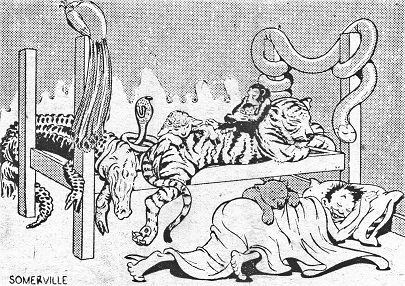
|
G.I. Dogs In Doghouse;
Gentle Cobras To Fore
By T/7 OSMOSIS FINK The Poor Man's Karl Peterson
If the new Theater commander should chance to ask me (my office hours are, loosely speaking, from 8 a.m. to 4:30 p.m. except Sunday afternoon, when I knock off to study my yogi lessons), I would suggest to him that the Research Department, I. & E. Section, make a study of G.I. pets.
Time was, I recall, when a G.I. was perfectly content to own a dog as a pet. Fact is, at one time in this family fishwrapper's erratic history, we seriously considered appointing a Dog Editor to chronicle such homespun stories as that of "Maggie," of the Umpty-Ump Bomber Squadron, who participated in 50 missions without relief ("Maggie is a plane-broken little lady"), and that of faithful "Bowser," of the 44½ Medium Messkit Maintenance Platoon, who saved his master from missing roll call every morning by nipping him daintily on the instep. We were frustrated by T/O restrictions, however.
FRIGHTENING TREND
But, to judge from the frightening trend, man's best friend is now strictly declasse. This growing suspicion crystallized this week when, as reported in Briefs from the Brambles, much was made of the fact that two G.I.'s are gloating inanely over a collection of three cobras and boasting they were once the proud possessors of a banded krait and a Russell's Viper. Frankly, were your man Fink a barracks mate of these two characters, he'd have a compelling concern over the whereabouts of the missing wrigglers and sparing applause for their owners.
Steps should certainly be taken to dampen the curious ardor of the mongoose fancier. I enjoy my mongoose best from a distance.
Other candidates for a Section Eight have an attachment toward tigers. Your correspondent holds to the belief that a good tiger, like a good Jap, is one that is considerably defunct. Imagine our consternation when a G.I. from the brambles, definitely short on sense but long on good intentions, walked into the Roundup office with a tiger that he offered us as a mascot. Assured that the chain around the beast's neck was sufficiently stout, the staff crawled from the rafters and informed him, not very diplomatically, that we couldn't fit him into our allotment.
We must admit that the Roundup, in the long ago, had a passing fascination in a pair of Himalayan bear cubs. They weren't housebroken and our sweeper belonged to a union that frowned upon prompt remedial action after their calls to nature. Weary of broken field running through the office, we reluctantly returned them to the former owner. Recently we received a photograph that convinces us of our good fortune at having arrived at the decision. They had grown as rugged as a pair of Notre Dame tackles and in a free-for-all with Man Mountain Dean, Sandor Szabo, Jim London, and four Polack coal miners from Scranton we'd have to rate the bears odds-on favorites.
AGREE WITH CATS
I confess to be wholeheartedly in sympathy with the congenital enmity cats exercise against rodents. Even the whimsical story of Bing Ming, the Mouse Than Can Sing, chronicled in the Roundup, leaves me colder than a frost-bitten Eskimo. A singing mouse. How fraught with terrible implications.
|
FANATICAL MASS EFFORT
We shudder to think of the fanatical mass effort to smuggle home this oddly-assorted bevy of pets when the War Department informs all good little G.I.'s that, the Japs having quit, they can now ship back to the United States. We learn through our special latrine-o-gram service that a small-scale attempt is already being made. One inspector at Karachi, we're informed, has been carted away in the wacky wagon. He considered it only an occupational hazard when he dipped a hand unsuspectingly into a barracks bag and a monkey but his thumb. Nor did he complain too vociferously when a suspicious bulge in a handgrip proved to be a python which wrapped itself fondly around his Adam's apple. But he started to weaken when a young crocodile glared at him balefully from the dark recesses of a B-4 Bag. And the final straw that broke his sanity was a pincushion that mysteriously started to walk and revealed itself to him as a two-month-old hedgehog.
Oh, give us back those happy days of good ole "Fido." We plead for a return to normalcy.
The Roundup is a weekly newspaper of the United States Forces, published by and for the men in Burma and India, from news and pictures supplied by staff members, soldier correspondents, Army News Service and United Press. The Roundup is published Thursday of each week and is printed by The Statesman in New Delhi and Calcutta, India. Editorial matter should be sent directly to Capt. Floyd Walter, Hq., U.S.F., I.B.T., APO 885, New York, N.Y. and should arrive not later than Saturday in order to be included in that week's issue. Pictures must arrive by Friday and must be negatives or enlargements. Stories should contain full name and organization of sender. Complaints about circulation should be sent directly to Lt. Drexel Nixon, Base Section, APO 465, New York, N.Y. Units on the mailing list should make notification of any major change in personnel strength or any change of APO.

|
JULY 5, 1945
Adapted from the original issue of India-Burma Theater Roundup
Copyright © 2016 Carl Warren Weidenburner
TOP OF PAGE PRINT THIS PAGE ABOUT THIS PAGE SEND COMMENTS
PREVIOUS ISSUE CLOSE THIS WINDOW NEXT ISSUE
|
|
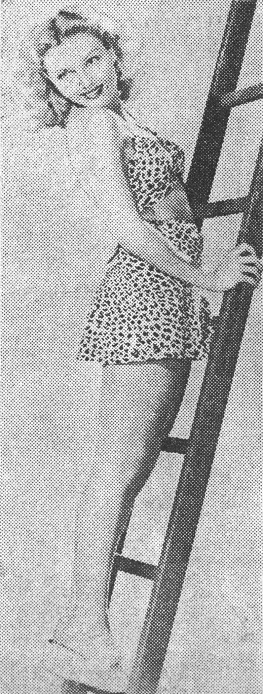 Blonde Lynn Merrick of Hollywood climbs a ladder in Cinema Town. We don't know where the ladder leads to, but who cares? Just so she doesn't go away.
Blonde Lynn Merrick of Hollywood climbs a ladder in Cinema Town. We don't know where the ladder leads to, but who cares? Just so she doesn't go away.
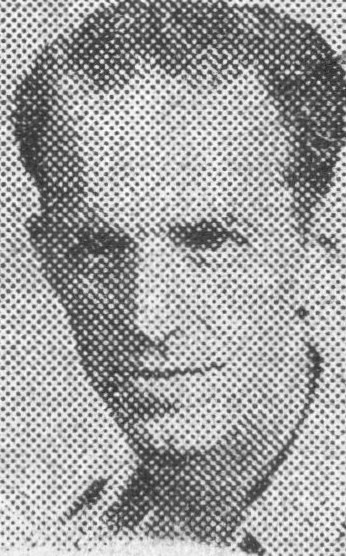
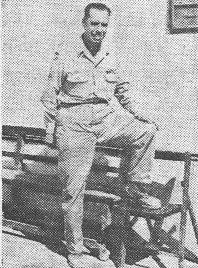
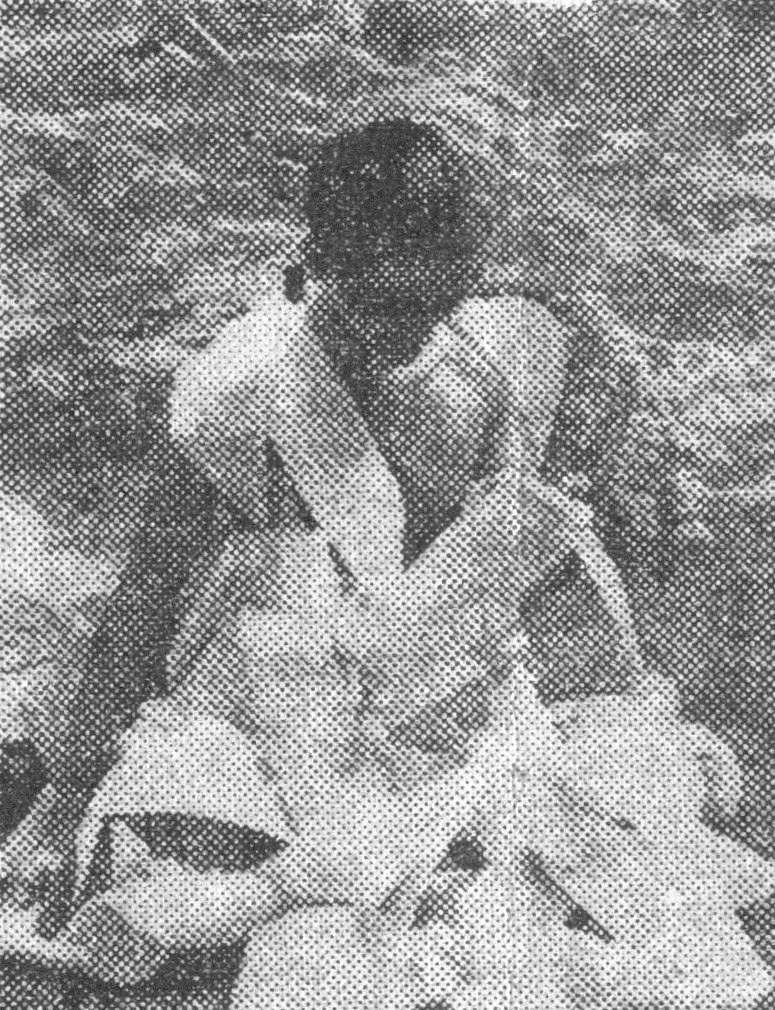 For all the latest on bigger and better sugar reports contact Signal Corps wallah, T/5 Fabian Truncellita, now stationed with the 835th Signal Bn. in New Delhi.
Truncellita has just received an 80-foot letter from his girl, Madeline McCormick.
"She generally writes a long letter," said the G.I., "but this time she surpassed herself.
For all the latest on bigger and better sugar reports contact Signal Corps wallah, T/5 Fabian Truncellita, now stationed with the 835th Signal Bn. in New Delhi.
Truncellita has just received an 80-foot letter from his girl, Madeline McCormick.
"She generally writes a long letter," said the G.I., "but this time she surpassed herself.
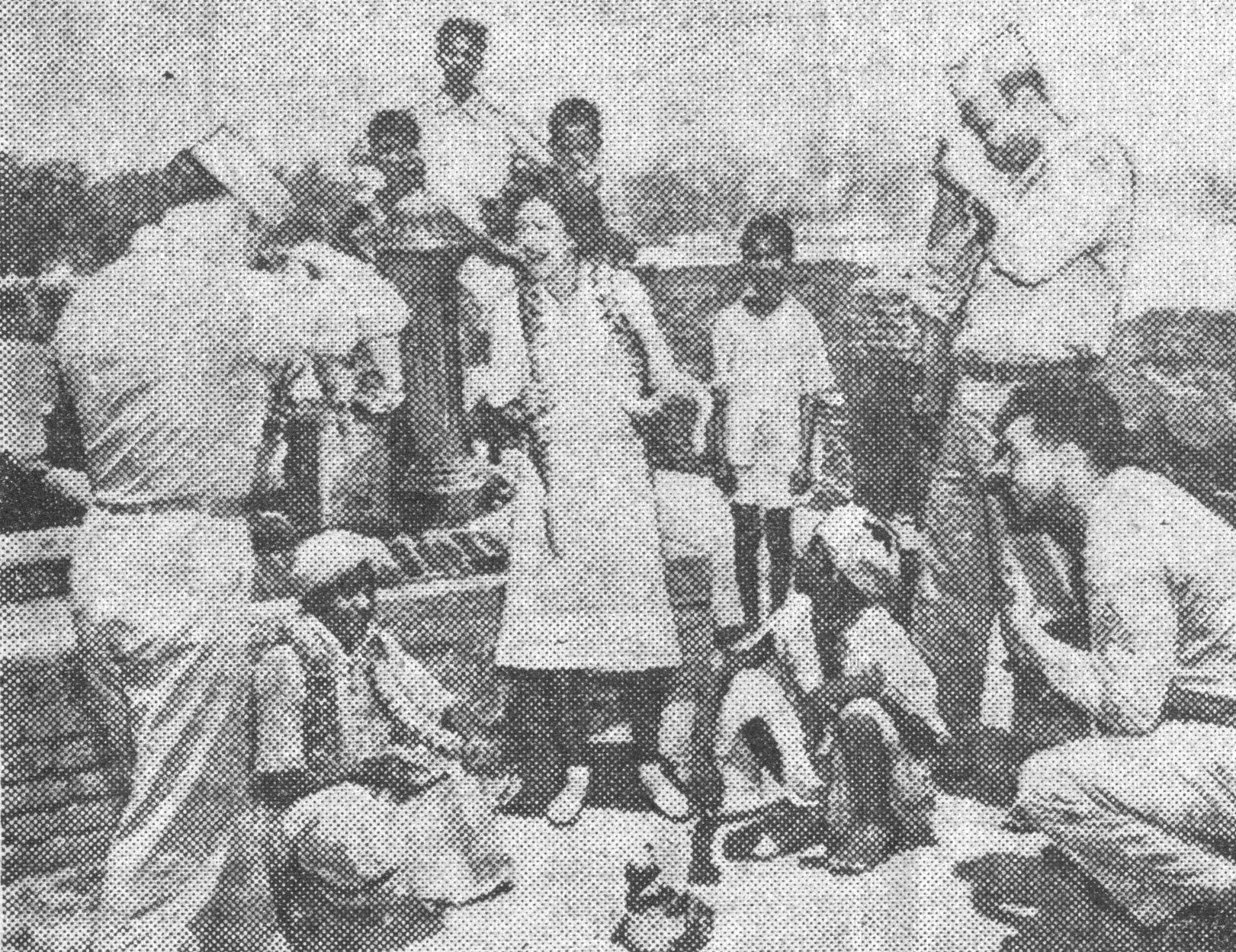 Complying with G.I. requests at Agra, Bebe Barr, Marion, Pa., Red Cross worker, consents to pose with a reptile wrapped around her neck.
Complying with G.I. requests at Agra, Bebe Barr, Marion, Pa., Red Cross worker, consents to pose with a reptile wrapped around her neck.